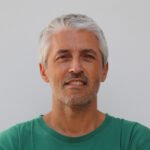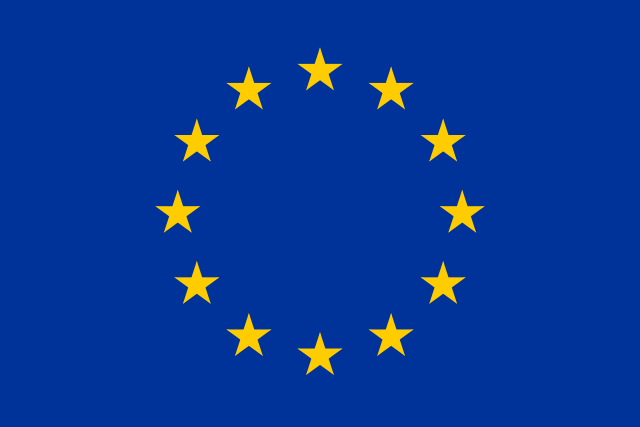Multiculturalism and collaboration were the leitmotif of this experience: it helped me get out of my comfort zone and feel comfortable in new situations, and improved my English and Portuguese along the way. For me the most relevant aspects were the projects in primary schools on migration, human rights and gender issues, as well as teaching Italian. I still have vivid memories of what I learned: language, organisational and management skills, but also creative and artistic skills. This experience has also helped me to deal with all kinds of work situations. EVS is definitely a unique opportunity to find one's vocation and to get involved in a new, foreign but always stimulating environment.
Can you imagine spending a whole year in a lovely Portuguese city, promoting sustainability and European values such as solidarity? That’s exactly what six young volunteers did! Staying in the beautiful wine growing region of Amarante, they got involved in the local community, helping organic farmers, organising fair-trade workshops in schools, supporting social institutions and running exciting cultural events.
Participation means it’s your responsibility to change your environment. Never wait for others to do things for you! This is the philosophy I try to pass to young people.
With more than ten years’ experience in running volunteer projects, Miguel Pinto, the Project Coordinator told us more about Ambassadors of European Solidarity:
What is the secret of the active participation in your project?
Most of our volunteers come from cities, without any experience in farming or community work. Everything is new to them, and meeting people from different backgrounds can be a little scary at first. But when they see how much the community appreciates what they are doing, especially in schools where they offer non-formal educational activities about culture, healthy lifestyle and volunteering, it has a fantastic impact on their confidence. Kids feel really energised by their workshops and can’t stop talking about them at home.
Exactly what kinds of activities are young people doing during the year?
Volunteers get involved across the whole of Amarante’s community. They support local institutions, the elderly centre, the disabled centre, the orphanage, the municipality and the schools. They help organic farmers sell their products at the Saturday market, and visit schools to give talks about the importance of fair trade and sustainability. Additionally, volunteers form a support team during other mobilities we organise. In this way they gain valuable experience of how other Erasmus+ programmes work and learn to facilitate workshops. We also encourage volunteers to start their own individual projects and share their passions!
How do you encourage young people to organise these personal projects?
We give them time and space to explore their interests. They only start after 3-4 months when they feel settled, able to speak some Portuguese and have decided on an interesting topic. At first, many say ‘I don’t know if I can do it’. But then an idea bumps up, and they really find it a rewarding experience. We also support them financially, for instance, we print pictures for the exhibitions they organise or we offer ingredients for the cooking workshops.
What does the timetable of the volunteers look like?
Most of our team members (including me) are former volunteers, and we know the challenges that a volunteer can face. Getting bored of an activity is one of them. So we don’t work with a fixed calendar. Every Monday morning we set the activities for the week, then leave the volunteers free to select which ones they are interested in. In making their decisions, they learn both how to negotiate within their team and take personal responsibility for their own ideas.
Does it work?
Absolutely. Volunteers set the cultural agenda of our youth centre as well as making it happen, sharing their own unique talents with the community. In the year of the Ambassadors of European Solidarity, for example, they offered Italian lessons and workshops about travelling on a tight budget, while in previous years volunteers have organised yoga, Zumba and cinema nights…
Who were the participants of Ambassadors of European Solidarity?
For ten years we have hosted volunteers in different volunteering projects, so many activities are done sometimes by a bigger group of volunteers. In the year-long project of Ambassadors of European Solidarity nevertheless six young people participated from France, Germany, Poland, Italy and Greece. There were five volunteers but when one of the girls received a job as teacher in her country, she quit the project and we needed to replace her. We contacted our partners who found a replacement very quickly. In the last ten years only four or five volunteers have left the project: in fact our volunteers have carried on even through the pandemic. Flexibility is important. For instance, the French volunteer was very young and did not speak English, so we had to arrange English lessons before he could learn any Portuguese. And as working with kids requires less verbal communication, we let him organise sporting activities at the orphanage, instead of going to all different hosting places. The taxi driver who picks up the volunteers at the airport speaks French, so he became his mentor.
Was it difficult finding a new volunteer for her place?
Not really. We immediately contacted our partners who found a replacement very quickly. In the last ten years only four or five volunteers have left the project: in fact our volunteers have carried on even through the pandemic. Flexibility is important. For instance, the French volunteer was very young and did not speak English, so we had to arrange English lessons before he could learn any Portuguese. And as working with kids requires less verbal communication, we let him organise sporting activities at the orphanage, instead of going to all different hosting places. The taxi driver who picks up the volunteers at the airport speaks French, so he became his mentor.
Do you have a strong team who support volunteers throughout the year?
Yes. Four staff members are responsible for managing the project, doing promotion and communication, linguistic support and being in contact with the volunteers daily. This was the first year when we had two complementary activities, and as part of one of these, organised a very successful mentor training. During the training weekend, mentors became a real, active group, created their own communication channels, and throughout the volunteering year they organised regular activities, dinners and bowling nights with the volunteers. Most importantly, volunteers could choose the mentor they preferred at an informal event we organised.
Who were these mentors?
Mentors are motivated people from many different backgrounds and age groups. Some have returned to Amarante after volunteering abroad, while others are from institutions we work with, as well as colleagues and clients from our youth centre and vegetarian restaurant.
What are the main steps of managing a long and intense project like this?
We began by collaborating with known organisations from other projects, who have become our main strategic partners. But to widen our network we always include one or two new partners as well. After our partner organisations have selected 3-4 potential candidates, we interview them and then make the final selection, with our partners preparing volunteers according to our standards. We keep in contact with the volunteers online until they arrive. During their induction week we introduce different topics related to volunteering and visit the hosting places. We also ask former volunteers to come and help break the ice with newcomers, sharing their experiences of volunteering and making them feel welcome. Former volunteers often use creative methodologies, theatre and pantomime to tell their stories.
Speaking about the learning outcomes, what did young people bring home from this project?
Some volunteers have gone on to start their own projects, the Italian volunteer with a particular interest in gender equality has joined an NGO, and we continue to work closely with her. She is a great example of the success of our training sessions that we run for volunteers in project management, design thinking, Erasmus+ and other initiatives. Every year our volunteers organise a volunteering camp in the city, inviting all European volunteers from across Portugal. Although it is not an official evaluation event, it is a very important meeting for our volunteers. That particular summer, our volunteers hosted around fifty of their colleagues for four days. It was a great opportunity to develop their organisational skills and share their experience with the local community.
About the project
Supported by:
European Solidarity Corps / Volunteering
EU Youth Programme Priority:
Sustainability, Environmental and Climate Goals
Topic:
Youth Participation / Activism and Decision Making
Visibility:
Almost 12,000 people followed the activities of the European volunteers on the youth centre’s Facebook page (not bad for Amarante, a city with 60,000 inhabitants!). The visibility of the project was enhanced by the European Parliamentary Election campaign and workshops at local institutions organised by the volunteers.
Organisations involved:
AVENTURA MARAO CLUBE (PT); Cooperativa para a Educação e Reabilitação de Crianças Inadaptadas, CRL. (PT), ASSOCIAZIONE CULTURALE EUFEMIA APS (IT), Santa Casa da Misericórdia de Amarante (PT), JUGENDKULTURARBEIT EV (DE), FUNDACJA ROZWOJU SPOLECZENSTWA PRZEDSIEBIORCZEGO (PL), Association Groupe d’Appui et de Solidarité (FR), Associação A Terra dos Homens (PT), YOU IN EUROPE (EL), União das Freguesias de Amarante (São Gonçalo), Madalena, Cepelos e Gatão (PT)














